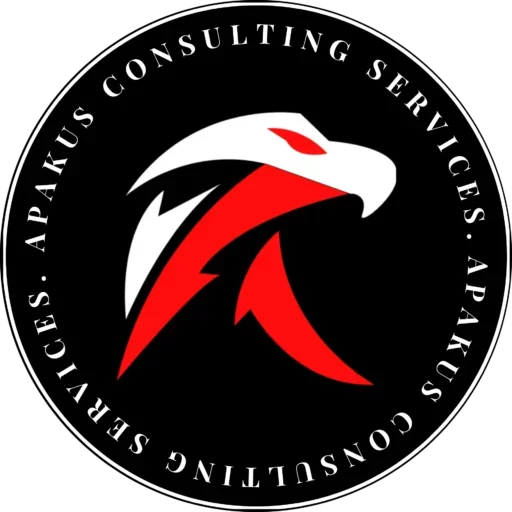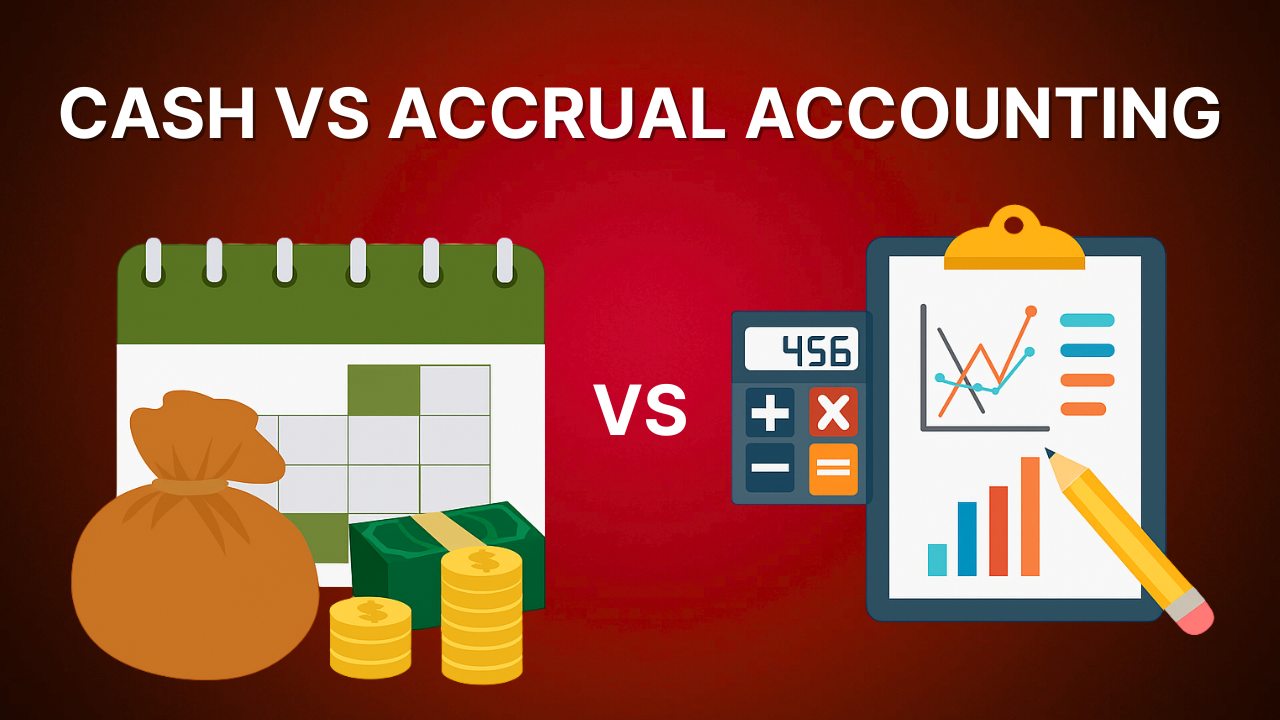When you’re running a business, one of the earliest and most important financial decisions you’ll make is choosing between Cash vs Accrual Accounting. This choice impacts not only how you track your income and expenses but also how you manage taxes, measure profitability, and make strategic decisions for growth.
I’ve spent over 15 years working with small businesses, startups, and established companies, and I’ve seen firsthand how the decision between Cash vs Accrual Accounting can either make financial management smoother or create challenges down the road. The method you choose today will shape how you interpret your numbers tomorrow.
What Is Cash vs Accrual Accounting?
Let’s break it down in plain terms before we get into deeper pros, cons, and real-world examples.
Cash accounting records income and expenses when money changes hands. You record revenue when you actually receive payment, and record expenses when you pay them.
Accrual accounting records income and expenses when they are earned or incurred, regardless of when cash actually moves.
If you invoice a client in April but get paid in June, accrual accounting shows the income in April. In cash accounting, it shows up in June.
At its core, Cash vs Accrual Accounting is a question of timing. And timing changes everything — from your tax bill to how you interpret your financial health.
Why Your Accounting Method Matters More Than You Think
Many small business owners start with Cash vs Accrual Accounting decisions based on simplicity. But the method you choose has ripple effects:
- Taxes: Your choice can accelerate or delay taxable income.
- Cash Flow Planning: One method may make your business look more profitable than it is, which can be misleading when planning expenses.
- Financing & Investors: Banks and investors often prefer accrual accounting for accuracy.
- Long-Term Reporting: Comparing growth year over year is easier when your data is consistent and complete.
I’ve worked with businesses that unknowingly paid thousands more in taxes simply because their Cash vs Accrual Accounting method didn’t align with their cash flow cycles. And I’ve also helped companies switch methods midstream to avoid costly surprises.
The Core Difference in Action: A Real Example
Let’s say you own a design agency. In December, you complete a $20,000 project.
- Under cash accounting, you don’t record the $20,000 until the client pays you in January.
- Under accrual accounting, you record the $20,000 in December, the month you delivered the work.
Now, imagine you also bought $5,000 in new equipment in December but didn’t pay for it until January.
- With cash accounting, your December books show $0 income and $0 expenses — even though you did real work and took on new costs.
- With accrual accounting, your December books show $20,000 income and $5,000 expenses, giving you a truer picture of your activity that month.
This is why Cash vs Accrual Accounting isn’t just about bookkeeping style — it’s about how you see the reality of your business.
Which Businesses Typically Choose Cash Accounting?
From my experience, businesses that benefit most from the cash method often share these traits:
- Simplicity matters – They want straightforward records that match their bank account.
- Lower transaction volume – Fewer invoices and bills make cash accounting manageable.
- Primarily small service-based work – Think consultants, freelancers, small shops.
- Tax timing flexibility – They want control over when income hits their books.
In short, if your business is straightforward and you don’t need complex reporting, cash accounting can work — but it’s not for everyone.
Which Businesses Typically Choose Accrual Accounting?
Accrual accounting often works best for companies that:
- Need an accurate long-term financial picture – Seasonal businesses, manufacturers, agencies.
- Manage inventory – Required by the IRS for certain inventory-holding companies.
- Have larger client contracts, Especially where payments come in stages.
- Want to attract investors or financing? Accrual offers the most accurate profitability reports.
I’ve guided companies through transitions from cash to accrual. While the process can be technical, the payoff is often better planning, improved cash flow management, and stronger credibility with lenders.
Common Misunderstandings About Cash vs Accrual Accounting
Over the years, I’ve noticed a few recurring misconceptions:
- “Accrual means you have more money.”
Not necessarily — it just shows income when earned, not when received. - “Cash accounting is always easier.”
It can be, but businesses with high transaction volumes can still find it messy. - “You can’t switch methods.”
You can, but you may need IRS approval and careful adjustments.
Understanding these myths is critical to making a smart choice for your business.
Laying the Groundwork for Choosing the Right Method
Here’s a quick framework I give my clients when evaluating Cash vs Accrual Accounting:
- Look at your industry norms – Some sectors have clear best practices.
- Think about growth plans – Will your needs change in 2–3 years?
- Review your cash flow cycles – Are you often waiting on payments?
- Talk to your tax advisor – There may be IRS requirements you don’t know about.
The best choice balances compliance, accurate reporting, and ease of management.
Pros, Cons, and Real-World Scenarios of Cash vs Accrual Accounting
Choosing between Cash vs Accrual Accounting isn’t just a matter of preference — it’s a decision that will shape how you report income, calculate taxes, and interpret your company’s financial health for years to come. In my 15 years advising business owners, I’ve seen the wrong choice lead to inflated tax bills, poor cash management, and even lost investment opportunities.
Below, we’ll explore the pros and cons of each method, with real-life scenarios so you can see how the differences play out in actual businesses.
The Pros of Cash Accounting
- Simplicity and Clarity
Your books align directly with your bank account. If there’s money in the account, you can spend it — there’s no confusion about unpaid invoices or future bills. - Tax Deferral Opportunities
If you receive a large payment in December, you can delay depositing it until January to push that income into the next tax year. - Lower Administrative Burden
Fewer journal entries and no need to track receivables or payables unless you choose to. - Perfect for Smaller Businesses
Freelancers, consultants, and micro-businesses often find that Cash vs Accrual Accounting choices lean toward cash because it fits their workflow.
The Cons of Cash Accounting
- Misleading Profitability
If you receive payment late, your books may show low revenue in a busy period, leading to bad decisions. - Poor Long-Term Visibility
It’s harder to match income with related expenses, making financial analysis less accurate. - IRS Limitations
Certain businesses, especially those with inventory, must use accrual accounting once revenue exceeds $25 million (some smaller businesses are also required depending on structure).
The Pros of Accrual Accounting
- Accurate Profit Measurement
Matches income to the period when it was earned, providing a true picture of performance. - Better Long-Term Planning
Ideal for budgeting, forecasting, and tracking trends over multiple periods. - Required for Many Businesses
If you hold inventory or plan to seek major financing, accrual accounting is often the standard. - More Professional Reports
Investors, lenders, and partners often view accrual-based financials as more reliable.
The Cons of Accrual Accounting
- Complexity
Requires tracking accounts receivable, accounts payable, and adjusting entries. - Tax Liability Timing
You may owe taxes on income you haven’t yet received, potentially creating cash flow strain. - Higher Bookkeeping Costs
Professional help is often required to set up and maintain accurate records.
Comparing Cash vs Accrual Accounting in Key Areas
| Category | Cash Accounting | Accrual Accounting |
| Ease of Use | Simple; aligns with bank balance | More complex; requires adjusting entries |
| Accuracy | Can distort profitability | Matches revenue with expenses accurately |
| Tax Planning | Flexible income timing | Less flexibility; taxes due when earned |
| Cash Flow Insight | High considered more professional | Strong for long-term analysis |
| Investor Appeal | Limited | Less flexibility; taxes are due when earned |
IRS Rules and Compliance Factors
When deciding on Cash vs Accrual Accounting, it’s critical to understand IRS requirements:
- Small Businesses (<$25M revenue) can often choose either method.
- Businesses with Inventory may need to use accrual accounting unless they meet specific exceptions.
- Changing Methods requires IRS Form 3115 and may involve adjusting prior-year income.
In my work, I’ve seen many small business owners assume they can switch methods without notifying the IRS — a mistake that can trigger audits and penalties.
When Switching Methods Makes Sense
While starting with the right method is ideal, sometimes growth or changing business models require a switch. Common triggers include:
- Revenue growth above $25M.
- Expanding to sell physical products.
- Preparing for acquisition or investor funding.
- Experiencing cash flow issues due to tax liabilities on unpaid invoices.
How to Choose and Successfully Implement the Right Accounting Method
By now, you understand the mechanics, pros, and cons of Cash vs Accrual Accounting. But the big question remains: Which one is actually right for your business?
Choosing between these two methods isn’t just a bookkeeping decision — it’s a strategic choice that affects taxes, cash flow, growth potential, and the credibility of your financial reporting. Over the last 15 years, I’ve helped businesses in multiple industries make this decision, and I’ve found that the best choice often depends on a blend of business size, complexity, and long-term goals.
Step-by-Step Framework for Choosing Between Cash vs Accrual Accounting
1. Evaluate Your Business Model
- Service-based, low transaction volume? Cash accounting may be sufficient.
- Product-based, inventory-heavy? Accrual accounting is often required and provides better tracking.
2. Assess Your Growth Plans
If you plan to scale, secure financing, or attract investors, accrual accounting may give you the professional reporting credibility you’ll need.
3. Map Your Cash Flow Cycle
If you frequently experience delayed payments, accrual accounting can still show profitability even when cash is tight, but it may also create tax obligations on money not yet collected.
4. Consider Industry Norms
Some industries have strong preferences or legal requirements for Cash vs Accrual Accounting.
Industry-Specific Recommendations
1. Freelancers and Consultants
- Best fit: Cash accounting for simplicity, unless working with large contracts spanning months.
- Why: Keeps records aligned with actual cash on hand.
2. Retail and E-Commerce
- Best fit: Accrual accounting.
- Why: Inventory tracking and sales-tax matching are far easier with accrual.
3. Construction and Contracting
- Best fit: Accrual accounting or hybrid (percentage-of-completion method).
- Why: Matches revenue to project stages, preventing misleading profit numbers.
4. SaaS and Subscription Businesses
- Best fit: Accrual accounting.
- Why: Accurately recognizes subscription revenue over time.
Common Mistakes to Avoid When Choosing
- Choosing for Convenience, Not Accuracy
Short-term simplicity can lead to long-term confusion and costly mistakes. - Switching Without IRS Approval
Even small businesses need to follow formal steps when changing methods. - Failing to Adjust Financial Processes
Moving to accrual accounting without updating invoicing, expense tracking, and reporting systems can create errors.
How to Transition Between Methods Without Disrupting Your Business
Switching between Cash vs Accrual Accounting is more than just flipping a switch in your accounting software. It involves IRS rules, careful adjustments to your books, and updated workflows to prevent reporting errors. If it’s not handled correctly, you risk filing inaccurate taxes or creating inconsistencies in your financial history.
At Apakus, we specialize in making this process smooth, compliant, and stress-free for business owners. Here’s how we handle it for our clients:
1. Initial Review & Strategy Session
We start by reviewing your current books, business model, and goals to determine the best timing and approach for the transition.
2. IRS Compliance & Documentation
If IRS approval is required, we prepare and file Form 3115 (Application for Change in Accounting Method) on your behalf, ensuring all requirements are met.
3. Accurate Conversion of Records
We convert your financial records to the new method, making adjustments to accounts receivable, accounts payable, and inventory to ensure a clean start.
4. Workflow Updates & Training
We update your accounting processes and, if needed, train your team so they can confidently manage the new system in the future.
Final Thoughts: Choosing with Confidence
When it comes to Cash vs Accrual Accounting, there’s no one-size-fits-all answer — but there is a best answer for your business right now. The key is understanding that this choice shapes not just your books, but also your decision-making, tax strategy, and growth trajectory.
From my experience, the businesses that thrive financially are the ones that revisit their accounting method as they grow, staying flexible and willing to adapt. Whether you stick with cash for its simplicity or move to accrual for its accuracy, make the choice deliberately, not by default.
Key Takeaway:
- If simplicity and direct cash tracking are most important, cash accounting works well for small service-based businesses.
- If accuracy, growth readiness, and investor credibility matter, accrual accounting is the stronger choice.
Choosing between Cash vs Accrual Accounting is one of the most important financial decisions your business will make. At Apakus, we make that choice simple — and implement it seamlessly. Book your free consultation today, and let’s get your accounting working for your growth.










 447 Broadway, 2nd Floor, Suite 2531, New York, NY 10013, USA
447 Broadway, 2nd Floor, Suite 2531, New York, NY 10013, USA 20 Wenlock Road, London, N1 7GU, UK
20 Wenlock Road, London, N1 7GU, UK
